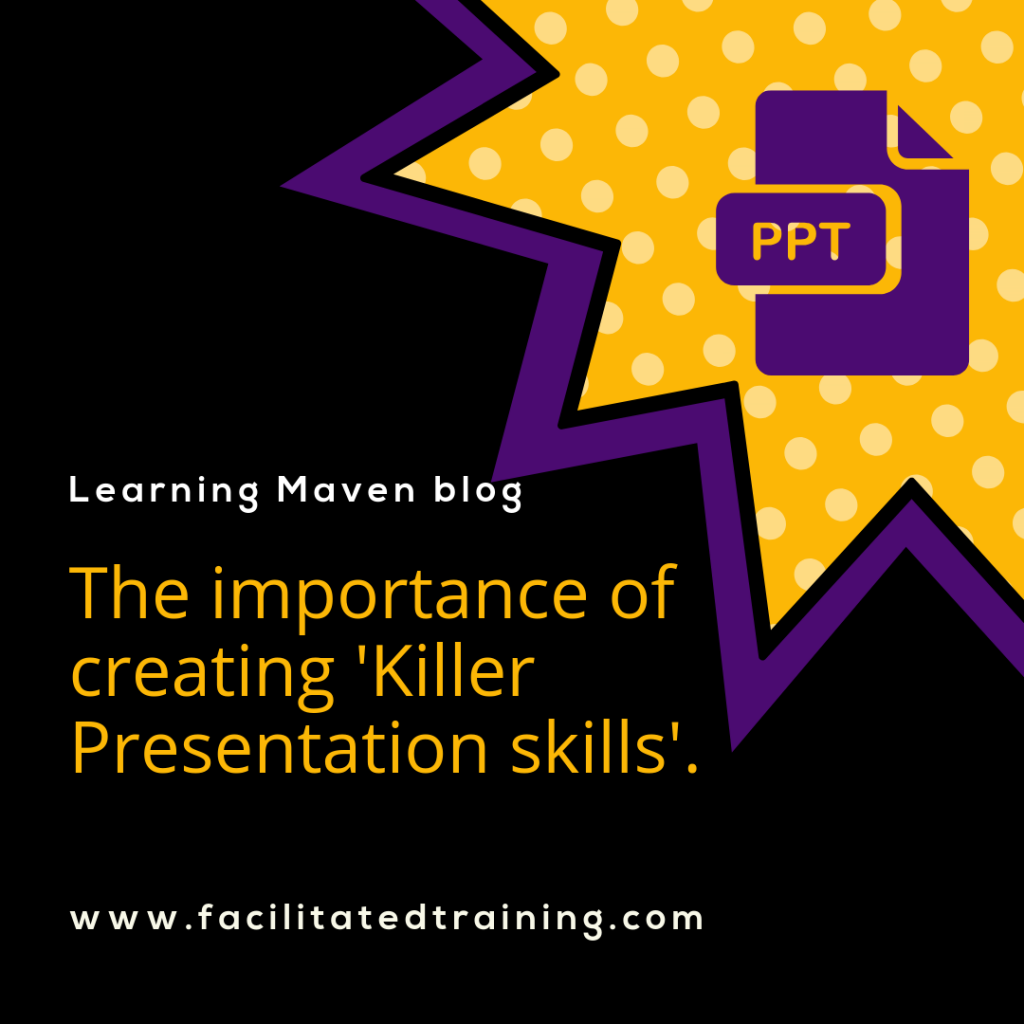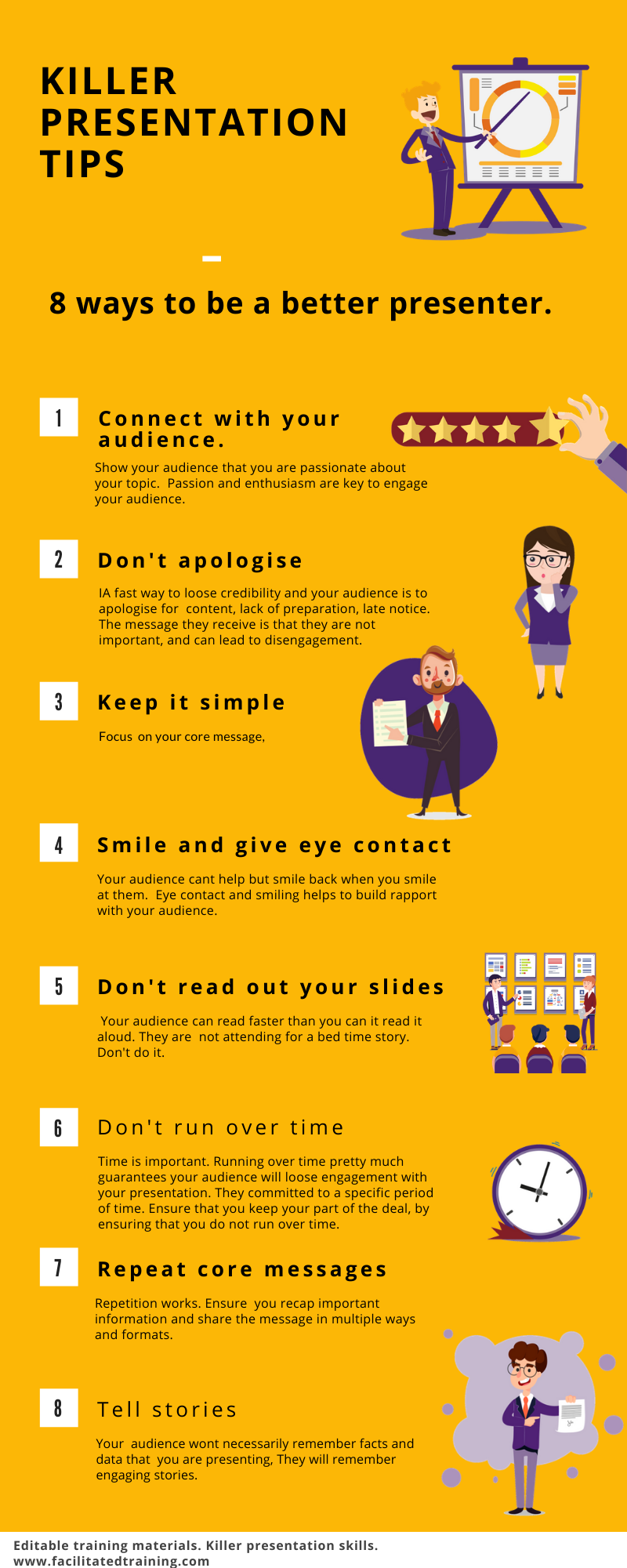Killer presentation skills are key skill in business today.
Developing killer presentation skills in the workplace is essential for improving communication and creating positive learning experiences. In this article, we’ll explore effective presentation skills and why they are important for effective communication regardless of role and seniority.
Everyone must give a presentation at some point in their lives, whether they are a student, perhaps at a funeral, school leaver in their first job or a professional. Presentations are a great way to communicate to groups and ensure your audience understand the message you are conveying. Presentations can be useful in numerous in the workplace, which is why it’s a good idea for organisations to invest time in training their employees to present, well.
Importance of Presentation Skills
In workplaces today, high emphasis on excellent presentation skills. This is because they play an important role in convincing clients and customers. Internally, management with excellent presentation skills is better able to communicate the mission and vision of the organization to the employees.
What are the benefits of effective presentation skills?
- When striking deals and gaining clients, it is essential for business professionals to understand the audience. Excellent presentation skills enable an individual to mould his message according to the traits of the audience. This increases the probability of successful transmission of messages.
- Professional and engaging presentations reinforce the image and perception of professionalism
- Increases the effectiveness of messaging and allows for reinforcement
- Allows for ‘real-time feedback from the audience via body language and questions.
Maintaining an Audible Tone & Pace
It’s essential to speak clearly and not talk on fast forward, due to nerves. For some, it will take practise to slow down. Use pauses between elements and new information, allowing the audience to digest what has been shared.
Never make excuses.
An effective presenter backs themselves preparation and doesn’t make excuses. Telling the audience that they are not very good at presenting or they had little time to prepare will have the audience wondering why that are wasting their precious time.
Don’t read your slides.
The truth is, that the audience can read slides faster than the presenter can read them out. If the plan is to read word for word the slide deck, then the presenter should cancel their presentation and send out the slide deck as an attachment. Slides should accentuate the message. Using more visuals than words on the slide deck will solve this problem.
Harness the power of genuine emotion.
Many speakers tell self-deprecating stories, but simply admitting a mistake is a waste when using to highlight how far the presenter has come. Instead, the presenter could tell a story and let their emotions show. If they were sad, they should say so. If they cried, they should say so. And so, on.
When presenters share genuine feelings, they create an immediate and lasting connection with the audience.
Emotion trumps speaking skills every time.
Find something the audience doesn’t know.
When was the last time you heard someone say – wow the slide deck and Gantt chart was terrific?”
Find a surprising fact or an unusual analogy that relates to your topic. For example, the presentation was on preferences; the presenter could start with the fact “Did you know that all polar bears are left-handed? Audiences love to cock their heads and think, “Really? Wow….”
Use the power of repetition.
The audience probably hears about half of what a presenter says, …and then they filter that through their perspectives.
An effective way for a presenter to do this is to create a structure that allows the presenter to repeat and reinforce key points.
- First explain a point,
- then give examples of how that point can be applied,
- and at the end provide audience action steps they can take based on that point.
Since no one can remember everything in a presentation, what is repeated has a much greater chance of being remembered.
But don’t ever run long.
A 30-minute presentation should take 25 minutes
An hour, take 50.
It is vital to ensure that the audiences time is respected
Finish early and ask if anyone has questions. Or invite them to see you after the presentation.
But never run long… because all the goodwill you built up could be lost. Goodwill won’t start if the presenter is late, and hasn’t set up their av equipment.
To summarise:
How can you make a good presentation even more effective?
- Show your Passion and Connect with your Audience. …
- Don’t apologise
- Keep it Simple: Concentrate on your Core Message. …
- Smile and Make Eye Contact with your Audience. …
- Don’t read aloud the slides
- Don’t run overtime
- Repeat core messages
- Tell Stories.
- Make sure that you can be heard
Presentation skills are invaluable and can make or break a sale or a project. Excellent presentation skills can help individuals get ahead in their career, so it’s a good idea to start.
Are you seeking killer presentation skills in your workplace? Do you have the skills to train others in presenting effectively, but don’t have the time to create the training materials?
Facilitated Training has the solution that you need. Editable training materials, that can be used again and again. Insert your company logo, add in case studies or examples from your workplace, or train using the quality training materials, as is.
www.facilitatedtraining.com
Click here to learn more about purchasing “Killer Presentation skills training. “



